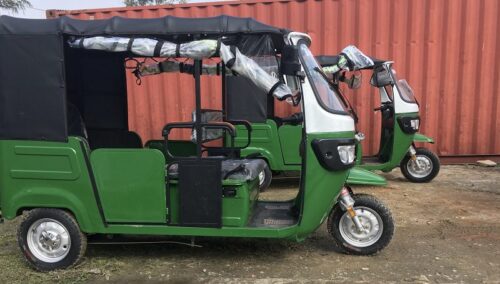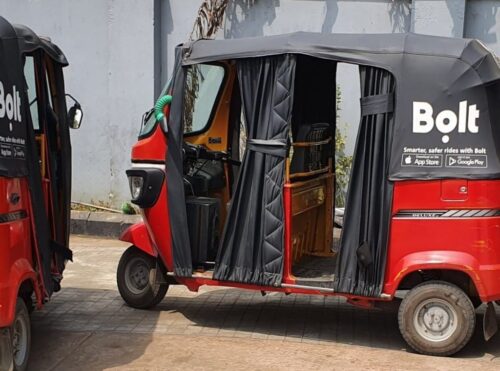
Bolt has introduced electric tricycles (commonly known as keke) in Lagos as part of its broader strategy to grow its electric vehicle (EV) operations in West Africa. Beginning in May, the company will deploy 25 electric tricycles developed in partnership with SGX Mobility, a Lagos-based electric mobility startup.
While Bolt has already operated tricycles in cities such as Jos and Uyo, this marks the company’s first venture into electric-powered options in Nigeria. Lagos riders can now select electric tricycles through the Bolt app, offering a more sustainable and cost-efficient mode of urban transport.
Each tricycle costs ₦3.2 million (approximately $1,996), but Bolt is offering a lease-to-own model that lowers the barrier to entry. Drivers are expected to make a ₦208,000 ($130) down payment, with flexible repayment plans spanning 18 to 24 months. Lease payments are set at ₦32,000 ($20) per week or ₦156,000 ($97) per month. Battery swaps, which replace the need for fuel, are priced around ₦6,500 ($4.06) daily—roughly half the cost of fueling a petrol-based tricycle.
“This isn’t just about launching new vehicles—it’s about creating a full ecosystem that benefits drivers,” said Caroline Wanjihla, Bolt Africa’s spokesperson. “Electric tricycles significantly reduce running costs, and through our financing model, drivers can own their vehicles in just two years while saving on fuel and maintenance from the start.”
The initiative also responds to growing concerns around existing ride-hailing lease models. Drivers on platforms like Moove and LagRide have previously raised complaints about rigid repayment terms, high defaults, and repossession of vehicles. Bolt is aiming to offer a more balanced approach with lower upfront costs, transparent payment structures, and a reduced commission rate of 15%, compared to the industry average of 25%.
“With LagRide and Moove, you’re dealing with more expensive vehicles. Our tricycles are more affordable, and the lease terms are flexible,” explained Zankyang Duniya, Operations Manager at Bolt.
The vehicles are capable of reaching speeds up to 80 km/h and can run for up to 12 hours on a full charge. A battery swap station has been established in Eagle Square, Surulere, to minimize driver downtime and optimize daily earnings, according to Ayo Mustapha, Corporate Finance Manager at SGX.
Bolt’s entry into electric tricycles also coincides with increased fuel prices that have pushed many cycle operators to seek cheaper alternatives. While some have shifted to compressed natural gas (CNG), challenges around conversion costs and limited refueling infrastructure remain. Bolt’s electric tricycles offer a cleaner, zero-emission solution with built-in financial and operational incentives.
Although this pilot phase includes only 25 vehicles, Bolt is closely monitoring user adoption and feedback. The company is prepared to adjust its lease structure, pause rollout, or reassign vehicles based on real-world performance. If successful, Bolt intends to expand to other Nigerian cities and additional African markets, including Ghana, Uganda, Tanzania, and Tunisia.
The company’s gamble is that despite Lagos’ notorious traffic and infrastructure hurdles, a well-structured and cost-effective EV offering can gain interest, especially when it prioritizes driver ownership, reduced costs, and sustainability.



